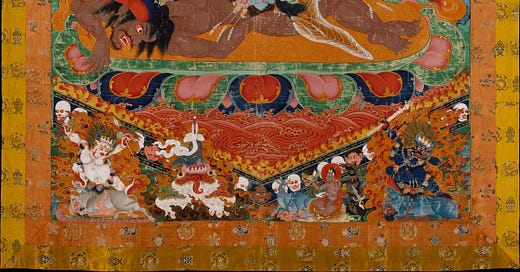Stand Straight, Not Straightened
The worth of the individual, The Big Lebowski, being an independent moral agent, and thinking of our deaths.
Imagine that you are, say, a Roman emperor. Even if you are not ruling at the height of the empire’s strength, you are still ruling over an empire that crosses continents. You command armies which, on the whole, do quite well on the battlefield. You lead a court which is impressively complex, full of machinations which display a laudable kind of interpersonal skill, even if they also display vice. Your subjects speak Latin, Greek, Aramaic, Celtic, and more. You are the most powerful man in the world.
And someday, you will not be. You will die, perhaps by natural causes or perhaps at the hand of an enemy. That enemy may even be a fellow Roman. Perhaps you will be regarded as a god posthumously — but there is a significant chance that you will be forgotten.
Marcus is aware of all this, and he writes in §6:
How many people who were once world-famous have by now been consigned to oblivion! How many people who once sang their praises have long since departed!
Because of the fragmentary nature of the Notebook 7, it can be difficult to see how this paragraph relates to the others. Perhaps it is a song of despair — Marcus crying out to the universe, seeing the cruel inevitability of fate. All men, even the emperor of Rome, will die. The world-famous Marcus (and he was surely world-famous) will be consigned to oblivion, and one day no one will sing his praises. Even now, his words remain true. His praises are still sung, especially in light of the revivalist movement of modern stoicism, but one day they won’t be. All traces of Marcus will be lost, eventually, and the universe will still move on.
But I do not think this is the best way to read Marcus. Philosophy prepares us for death, as Socrates tells us in the Phaedo. Marcus, as a good philosopher, is preparing for his death. And the first step to preparing is to recognize and truly accept that death will come for us all.
“Don’t be anxious about the future,” Marcus continues in §8. And the future surely includes our deaths.
What we must do — and this might be the biggest lesson from Marcus’ Meditations — is make the most of each day. This is not a call to hedonism for Marcus; we are seeking out the most pleasures that we can. Pleasures are fleeting. Vain pomp, plays on a stage — all of it is fleeting.
So what do we do to make the most of each day? We live by our principles. “The worth of every individual depends on the worth of what he values,” Marcus says. Our worth, in some sense, is determined by the principles we use to guide our actions.
Of course, Marcus must make an important caveat. There is an inherent dignity that is held in common by all of humanity. In Notebook 2, when discussing wrongdoers, Marcus reminds himself that he has seen their true nature — and that true nature is something they hold in common with him. It is a spark of the Logos. It is bit of the universe’s rationality.
But we can use or misuse this shared rationality. For Marcus, rational creatures ought to act virtuously, and acting virtuously is defined as acting in accord with reason and nature. (The two, for Marcus, are nearly synonymous.) The virtuous man must value the right sorts of things. These are his principles. “Stand straight, not straightened,” Marcus writes in §12.
That line is one that stood out to me as I read the notebook again. We want to hold ourselves to our principles, to be independent moral agents, and not live by principles merely because we have been ‘straightened,’ or forced to live by them. Principles which you live out because you are coerced are not really principles, after all.
As I was reflecting on this, a thought occurred to me: I find it easier to relate to someone who sincerely and strongly believes the opposite of what I believe than I do to someone who has no convictions. It is like the line from The Big Lebowski: at least they have an ethos.
Someone who holds to principles which are strongly opposed to mine at least has one thing in common with me: they have principles. Those who have no principles, who do not live as independent moral agents and allow themselves to be straightened, are much harder to relate to.
I suppose that when I am on my death bed, I would like to know that I lived for something. I would like to be able to say that I chose those principles freely as well — that I recognized their value and then chose to conform my practices to them, to pursue virtue as I best could. Then I could say that I stood straight, and perhaps I will have prepared for death.





Earlier this week I discovered your YouTube channel and sub stack, and I just want to comment that I really enjoyed this post. Really good stuff Jared.
Wonderful reflection. Do you think perhaps earlier on the path, it might be necessary for some to be "straightened" first before it becomes a natural straightening? I notice myself it is often hard to set habits and good practices in motion but once they are it becomes more fluid. Probably has to do with the neuroplasticity of the brain.